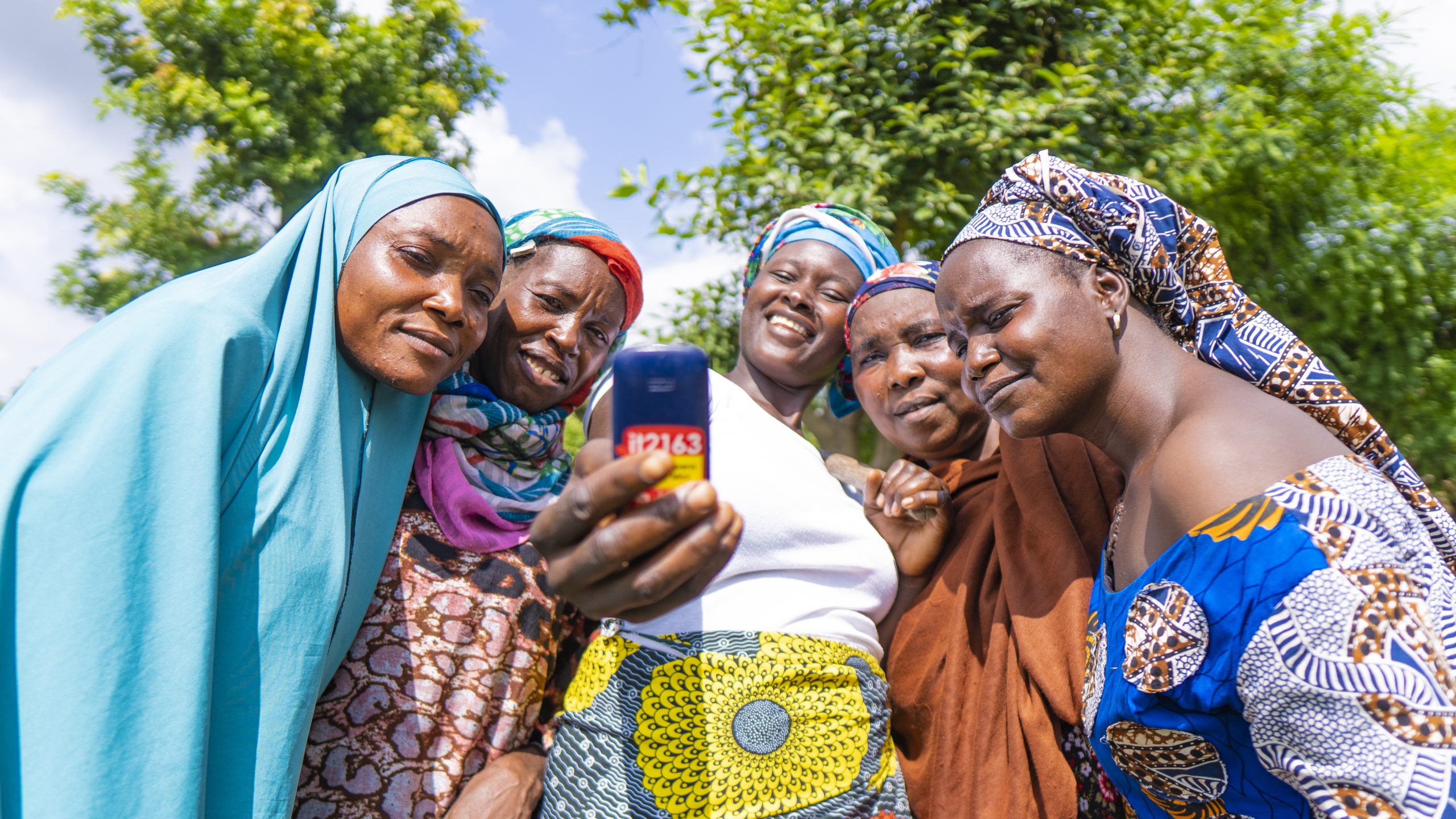International Women’s Day
Today, we come together with others around the globe–organizations, businesses, governments, and individuals–to recognize International Women’s Day. We utilize this day to both celebrate the strides we have made in increasing inclusion as well as the critical changes still necessary to achieve a more equitable world for all. This is “a day of collective global activism and celebration that belongs to all those committed to forging women’s equality” (International Women’s Day). This year’s theme, “Inspire Inclusion,” reminds us of the collective good we achieve when intentionally including the expertise, unique perspectives, and skillsets of women.
Women – Crucial to Progress
Innovation and success are fueled by an environment where diverse experiences are respected and valued. Women have made history by leading movements, making scientific, medical, and environmental discoveries, and advocating for the liberation of others (UNESCO). It’s impossible to imagine a world without women. Similarly, Nuru Nigeria would not be what it is today without its women leaders and the women farmers who are breaking down barriers and championing the inclusion of other women. Building the capacity of women benefits families, communities, and economies, particularly in the remote, rural regions that Nuru serves.
Women at Nuru Nigeria
As we consider what it means to “Inspire Inclusion,” we offer the reminder that inclusion should not be limited to traditionally well-educated, urban-dwelling women and their families, but should include all women in our societies, regardless of geographic location, education, ability levels, or other circumstances.
As Nuru began its work in northeast Nigeria in 2018, the Nuru model was adapted for the first time to work with women as an entry point to households and communities. For any household to qualify for registration in a Nuru Nigeria farmer association (FA), for example, there must be a registered woman from the household before a man from the same household can be registered. This focus helps increase women’s inclusivity, empowerment, and involvement in community decision-making. Once a woman in a household is registered with Nuru, men also become involved. In this way, women meaningfully contribute to the household’s income-generating activities, but men are not excluded from the process. A sense of partnership is fostered, and men become supportive actors in equipping women to make economic investments that will improve their shared livelihoods.
In 2022, 70% of the farmers registered with Nuru Nigeria were women, a direct result of this women-first approach to programming. Nuru Nigeria equips women with the educational and agricultural resources they need to improve their crop yields and incomes–critical components to lasting resilience for farmers striving to overcome poverty.
When women are included, they can discover their talents and transform their stories. Women like Amitiya, Ramatu, and Masudacha–Nuru Nigeria women farmers–are testaments to the power of women’s inclusion.
Nuru Nigeria Woman Farmer: Amitiya
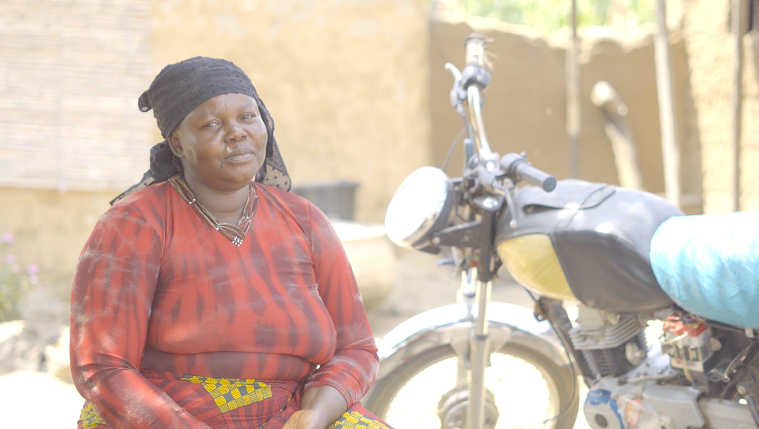
Amitiya sits in front of her motorcycle (2023)
Before joining Nuru Nigeria, Amitiya described herself as someone who “had nothing of her own,” as she was harvesting little to no groundnuts (peanuts) and soybeans from her farm. Despite her hard work, most of the seeds that Amitiya planted did not germinate well. After registering as a farmer with Nuru Nigeria, she learned about Good Agricultural Practices (GAP), like crop rotation, proper planting times, and various ways to support good soil health. With high-quality seeds that she accessed through her Nuru-supported FA, Amitiya applied her newfound knowledge on her farm. As a result, she experienced a significant increase in her harvest, particularly with groundnuts.
Amitiya’s yields have continued increasing year after year. As she sells the surplus from her yields, she increases her income and now employs community members on her farm. Amitiya notes, “I am now one of the richest female farmers in my community, and I can afford any property that I want in my community.”
Amitiya Improves Her Family’s Nutrition
In addition to increasing her income and crop yields while growing in her leadership role within her community, Amitiya is also improving nutrition for her family. For example, Nuru Nigeria introduced farmers to ugu (fluted pumpkin), a drought-tolerant gourd native to West Africa. The seeds are a source of healthy fats and proteins, while the shoots of the plant are high in iron and potassium, and the leaves are rich in antioxidants. Fluted pumpkin offers a variety of nutritional value to Nuru farmers in the food-insecure region of northeast Nigeria. “Before Nuru Nigeria introduced home gardening [permagardens] to us and provided seeds to plant (such as ugu, tomato, cucumber, and eggplant), we were ignorant of the benefits of ugu, and it was hard to obtain vegetables in my community. But now, I have them in my garden, and they form a part of my daily cooking ingredients.” Amitiya’s family now enjoys eating fluted pumpkin, and she considers her cooking less enjoyable without it.
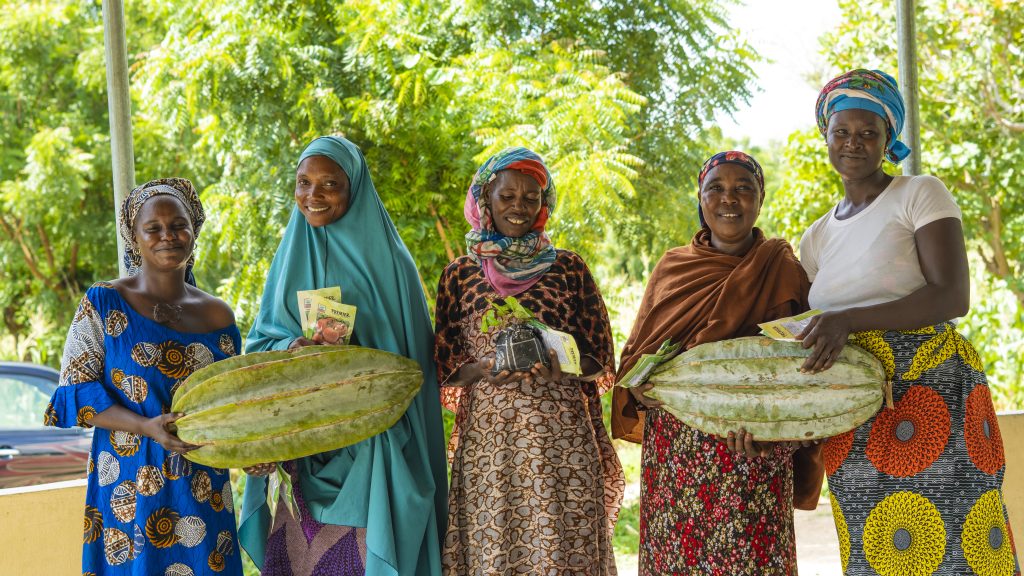
Nuru Nigeria Women Farmers with fluted pumpkins (2023)
The Economic Benefit of Nuru Nigeria’s Intervention
Amitiya always admired women who owned property and motorcycles, but before joining Nuru, she considered them inaccessible to her because she didn’t make enough money from her farm. After increasing her crop yields and growing her farm, Amitiya could sell significantly more and increase her income substantially. Today, she is a proud owner of a brand-new motorcycle. More than a means of transportation, the motorcycle is a significant asset to Amitiya, as she no longer has to walk and carry produce for sale on her back. The motorcycle has improved her efficiency, saving her time and allowing her to work on other tasks. It has also provided her family with an additional source of income, as she rents the motorcycle to other community members. Amitiya is proud to share now, “I have a son who is a diploma holder. I supported him through his studies from the proceeds I got from my farm.”
Nuru Nigeria Farmer: Masudacha
Masudacha was eager to join Nuru Nigeria when it reached her community. Nuru Nigeria supported Masudacha’s FA by building the capacities of participating women farmers, providing them with access to financial training activities on savings and loans, and equipping them to plan and prepare for the future.
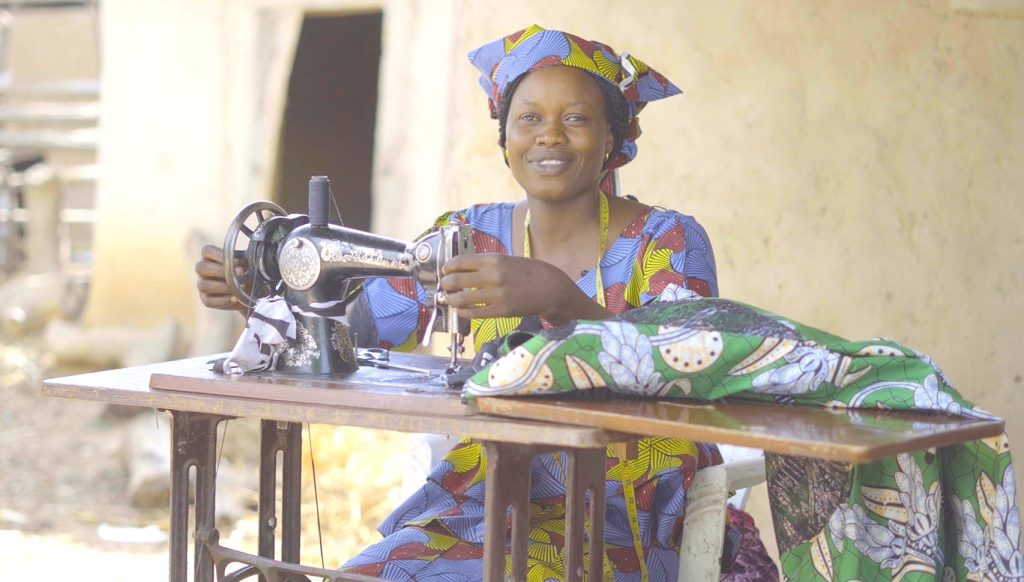
Masudacha with her sewing machine (2023)
Masudacha shares, “I’ve always had a passion for tailoring, so I collected a loan from my FA and went for nine months of training in a fashion line. I returned the loan, and after my training, I still collected another loan and bought a sewing machine to set up my tailoring workshop.” With the proceeds from her tailoring business, Masudacha could pay back the loan she collected from her FA. With her tailoring business flourishing, Masudacha has been able to purchase another sewing machine, and now the business is providing a steady stream of income for her family. Masudacha says, “I use proceeds from the tailoring to employ labor on my farm, and I also bought animals that I raise from the money I made from the tailoring business. I do support my husband financially to tackle the household needs.”
Nuru Nigeria Farmer: Ramatu
Ramatu’s story, symbolic of many women in Adamawa State in northeast Nigeria, underscores the impact that knowledge and technology can have in reshaping women’s livelihoods. Before joining Nuru Nigeria, Ramatu was growing, harvesting, and then manually grinding groundnuts (peanuts) to be made into groundnut cakes that can be sold for a profit. Manually grinding groundnuts is a labor-intensive and time-consuming process, drastically limiting Ramatu’s output. “Despite the stress, I didn’t get as much as I expected because I could only make only a few cakes at a time,” she lamented.
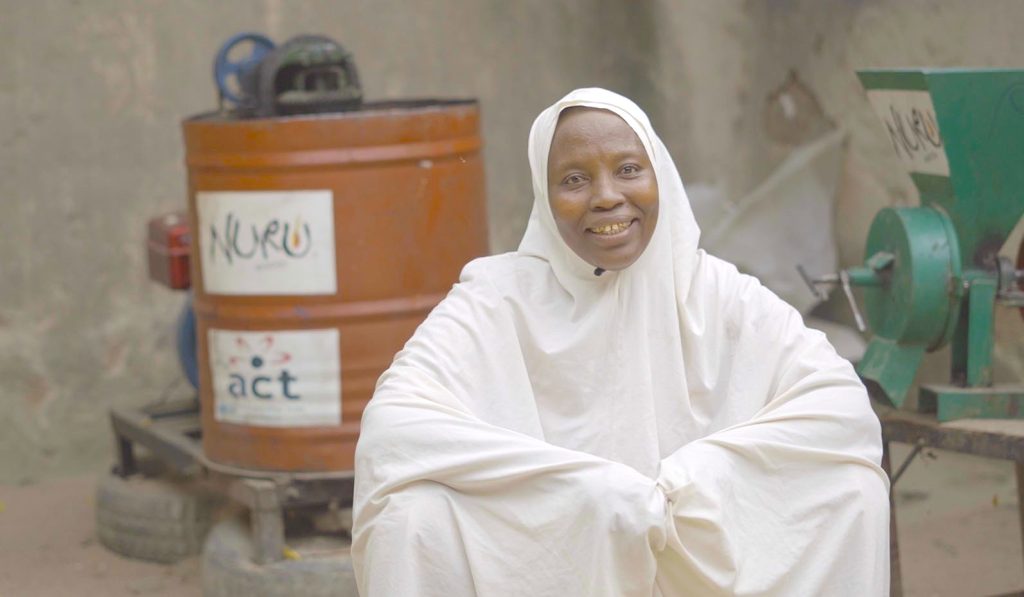
Ramatu (2023)
When Nuru Nigeria began working in Ramatu’s community, Ramatu joined a Nuru-supported FA. Through this FA, Nuru Nigeria provided various agricultural training, and taught farmers how to identify quality groundnuts for making cakes. Additionally, access to modern machinery revolutionized her work. “When Nuru Nigeria’s staff came, they taught us how we can identify good groundnuts for making groundnut cake. They taught us the process of making it and how to extract groundnut oil and gave us the machine to do that. This has really changed my life,” Ramatu shared with enthusiasm.
Ramatu now has the necessary skills and proper technology to increase her income by selling groundnut cakes. “Now I can make many groundnut cakes within a short time and also extract the oil simultaneously. This means more money and less stress for me,” Ramatu shared.
The Nuru Collective
Nuru Nigeria has set the standard for future Nuru Collective organizations with its women-first approach, demonstrating the immense value of championing women’s inclusion from day one. Nuru views the inclusion of women as critical to its poverty-eradication efforts, knowing women are vital to both the sustainability of farmer cooperatives and the future prosperity of their rural communities. Across the collective, we have taken conscious steps to build gender mainstreaming into our work since 2017. We are committed to a gender transformative approach that focuses on engaging women first, includes inclusive decision-making and leadership, and is measurable and actionable based on Nuru’s Women’s Economic Empowerment (WEE) survey in Nigeria.


